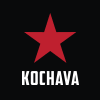Mattias Lindblad is the CEO Flamebait Games, makers of starving artist simulator Passpartout. The game recently scored a spot to compete in Indie Prize at Casual Connect Europe by winning the Swedish Game Conference, whose theme this year was inclusive game development.
“It is very exciting and we’re looking forward towards showcasing Passpartout in Berlin,” said Mattias. “We’re also looking forward to meeting other developers and playing their games.”

That’s not the only early acclaim that Passpartout has achieved, having already been greenlit by the Steam Community. “Being greenlit is a milestone for the Flamebait team and has given us a huge boost of energy,” Mattias noted. “I feel the interactions with the community and the feedback we got from being on Greenlight was the most exciting aspect of the process.”
Live for Your Art
Passpartout is a game that is literally an artist simulator, where players make paintings and try and sell them. It has a very whimsical tone to it, resembling a puppet theater and parodying early 20th century French art circles with characters wearing berets and carrying baguettes.
“We want the player to experience a small story and we felt the best way to do it was through a puppet theater,” detailed Mattias. “We also wanted to try a unique and interesting look. Another bonus is that the art direction provides the benefit of being time efficient, which lets us produce more than we otherwise would’ve been able to.”
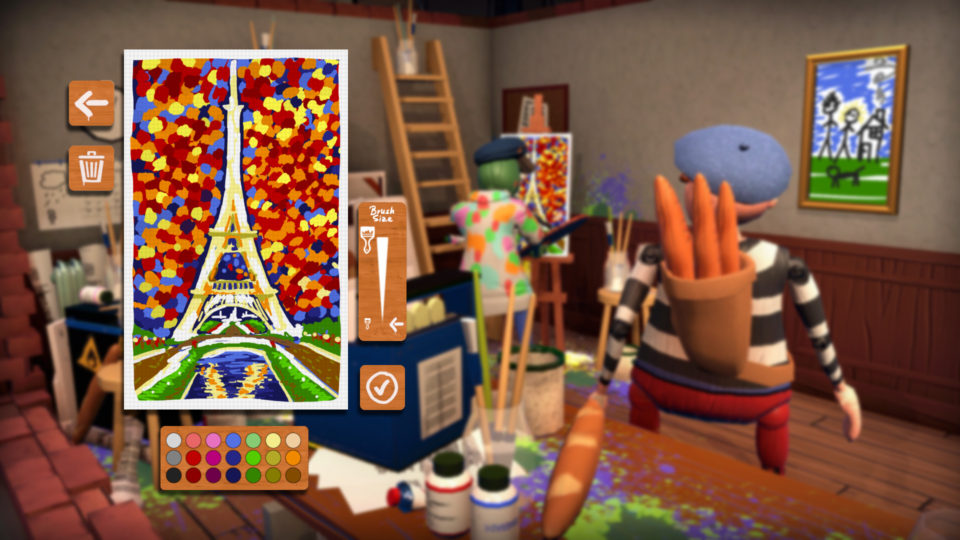
“When we prototype we’re very open-minded to strange game ideas. Anything we believe would become an interesting game we prototype regardless of the perceived market potential of the concept. After the prototype was played by 20 000 people and received good reviews we agreed that we were onto something and continued developing Passpartout,” Mattias continued, adding, “We feel like creating a game centered around art culture and lighthearted gags going hand in hand. We’re trying to convey a message about the art scene and the struggle of creative work in general, and we believe this is best done through satire.”
When asked how other developers could achieve similar success, Mattias suggested, “Verify your concept early. It will give you great indicators if the concept is good as well as provide you with valuable feedback for continued development.”
The Development of Art
Passpartout is being made in Unity, with various tools being used including Maya, Photoshop, Illustrator, Logic, Reaper and Visual Studio. Along with playtesting new features and content every week, the team lets potential players test Passpartout whenever there’s a mechanic or specific area that needs testing.
“We generally spend one week, from concept to finished prototype, which we release for the feedback,” said Mattias. “During the feedback weeks, we gather data and test the prototype. Testing our prototypes is vital for us to be able to decide if continued development is viable. This also gives us the luxury of tons of feedback from the start of the game development process to let us know which direction we should take the game.”
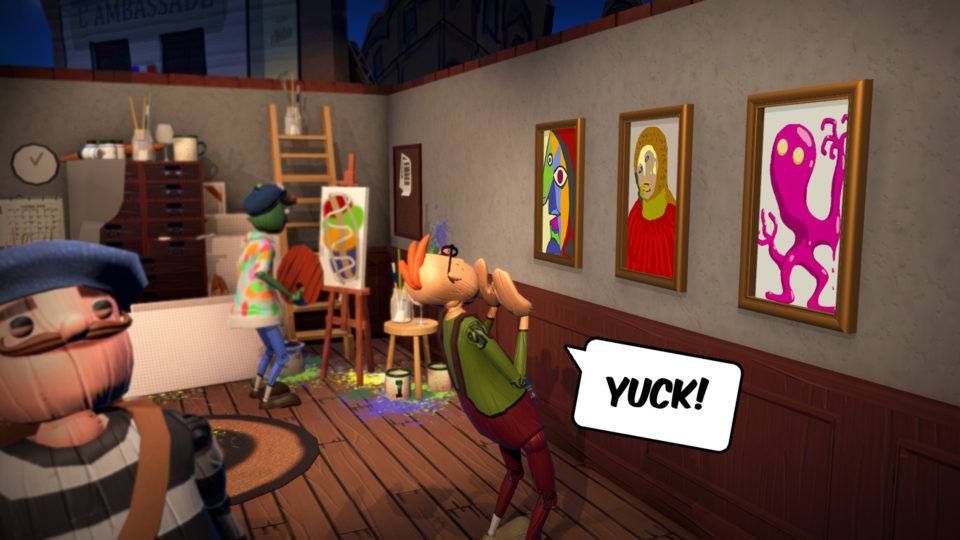
“I would say the most interesting reaction to our game was when I showed all our prototypes to two kids of a relative,” Mattias continued. “They didn’t care much for any of them until I showed them the last one, Jurgen’s Quest, which in our opinion is one of the worst things we’ve developed. You play as a Canadian lumberjack that has stolen Santa’s elves and runs down a snowy mountain, and try to escape without getting caught by Santa in his attack helicopter. It’s a silly idea but when the kids tried it they went into some sort of uncontrollable intense state of euphoria. Santa in an attack helicopter was apparently the most amazing thing in the world to those kids.”
Democratic Development
Flamebait is based in Gothia Science Park in Skövde as they take part in their incubator program, close to both the University of Skövde as well as their homes. “Living in Skövde, you’re surrounded by tons of passionate game developers, many of which are doing their own indie projects,” said Mattias. “It’s really the environment here in Skövde that inspired us.”

“Our inspiration can come from anywhere,” added Mattias. “To be able to make experimental games you have to look outside the game sphere. For example, Passpartout is inspired by the struggle of creative work we’ve faced ourselves. I suppose we draw inspiration from our lives in general.”
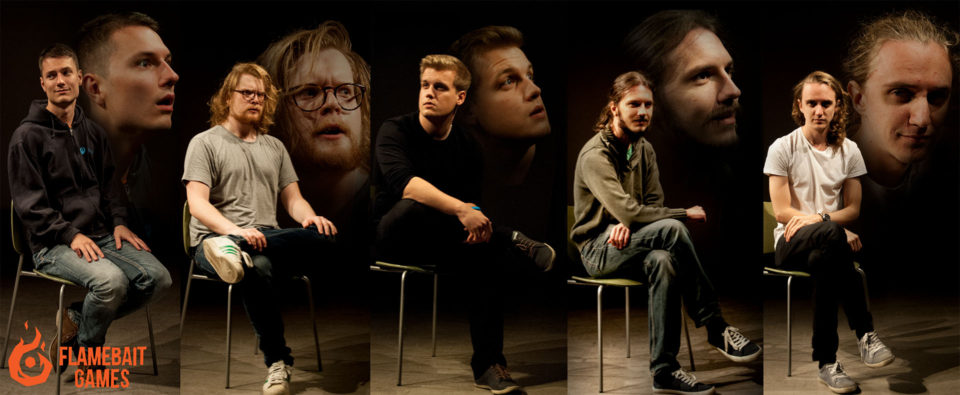
Mattias says that they have a great time joshing with each other while maintaining an open mind over what they’re creating. “We offer experimental original games, but it’s not only about what the studio can offer the gaming community, it’s also for us as a team to have creative freedom with what we do, which we feel is very important,” says Mattias. “We’re always having a blast at work and we’re not afraid to talk about new cool ideas.”
As far as their general organization, they take a democratic view on what to work on. Still, Mattias is the one who generally takes the lead when it comes to development.
“When deciding on which prototype to develop, each team member pitches a concept. After a vote, we decide which concept to prototype. The member who pitched is tasked with leading the prototype phase,” details Mattias. “As a small team, we can easily involve everyone in most of the bigger decisions. This allows for a very open creative process which, I believe, often generates more well thought-out decisions. We’re also not afraid to iterate should anything feel ‘off’. Of course, from the perspective that there is no way for us, as creative souls, to feel 100 percent satisfied with everything in the game - sometimes good is good enough!”
Don’t Develop Without Passion
Flamebait has mostly focused on the PC platform, where they are also heavy gamers themselves. They think this is better for the creative process, along with payments upfront rather than with a free-to-play system.
“Before Passpartout we developed a game for the mobile platform that we weren’t very passionate about,” noted Mattias. “We’re a team that rarely plays mobile games, often doesn’t enjoy them and has never developed games for that platform before. It ended up with us scrapping months of work to go back to the drawing board, which was very rough for the team. It taught us a great lesson though, we can’t make games without passion, and we’re sticking to that core principle.”
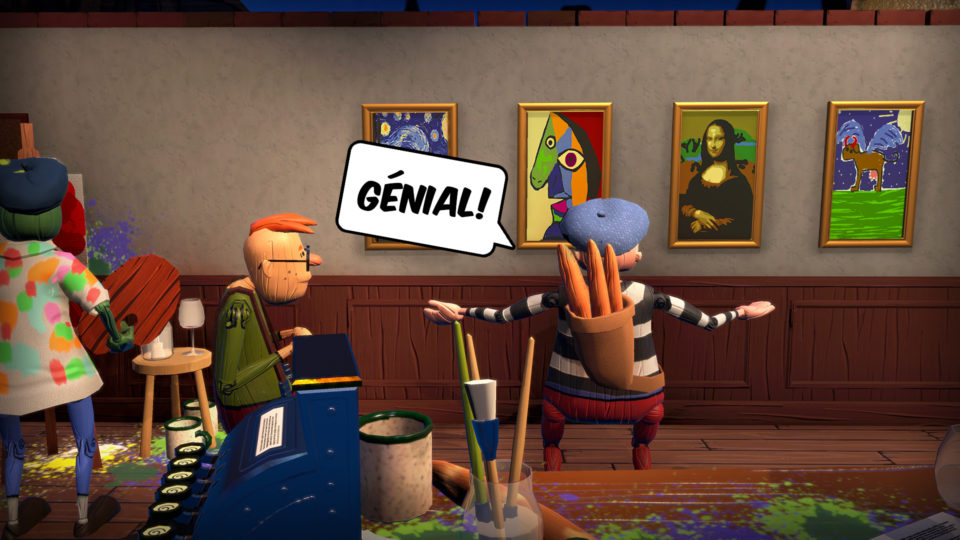
Thus, Mattias suggested to indie developers, “Don’t develop a project for which you have no passion. The result will most likely be poor as well as the whole experience being more or less soul-crushing.”

Moving forward, Mattias revealed that they do have future plans for updates to Passpartout. “At the moment, we’re working on something I believe will be awesome. A bitter art critic that will visit your gallery. After gazing upon one of your paintings he will, unlike the other customers, write a detailed review about it.”

Beyond Passpartout, the future is wide open, though Mattias says that Flamebait has some ideas. “Well, if you ask us now we’d probably make a full-scale version of Epidemic, a village plague god complex simulator, packed with features for the player to wreak havoc on a small medieval village. However, we’re entering a new prototyping phase soon, so the answer to this question will probably change within a few weeks,” concluded Mattias.
Comments









